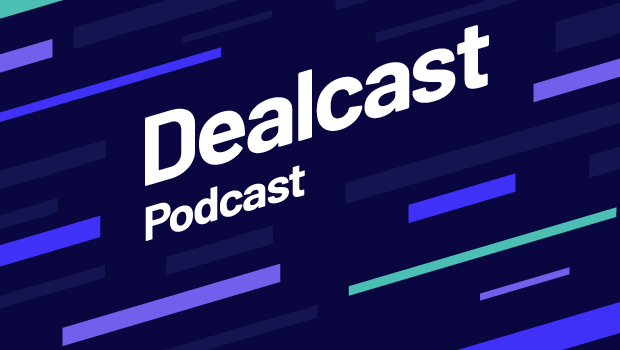The Emerging E.U./U.K. Approach to Ecosystem Tech Deals
20 October 2023
In this episode, we're looking at recent developments in regulatory approval for technology mergers in the U.K. and the E.U. We explore why the E.U. antitrust authorities blocked Booking Holdings' proposed EUR 1.63 billion purchase of Swedish peer ETraveli Group, why it matters and the potential impact it will have on other tech deals such as Amazon’s proposed USD 1.7 billion acquisition of iRobot.
Dealcast is presented by Mergermarket and SS&C Intralinks.
*****
Dealmakers, download the *SS&C Intralinks Deal Flow Predictor for Q4 2023* to see our data-driven prediction on where M&A will go globally and regionally in the next six months: https://www.intralinks.com/deal-flow-predictor
Transcript
Julie-Anna (00:05): Hello and welcome to Dealcast, the weekly M&A podcast presented to you by Mergermarket and SS&C Intralinks. I'm Julie-Anna Needham. I'm a business journalist who's been covering M&A for a decade. In this episode, we're looking at some big recent developments in regulatory approval for technology mergers both here in the UK and in the EU. I'm joined by Jacob Parry, who's the chief regulatory correspondent in Brussels. Hi Jacob, thanks for joining me today.
Jacob (00:40): Hi Julie-Anna. Thanks for having me.
Julie-Anna (00:42): So, can we start by looking at the European Commission's veto of Etraveli and Booking? Why did the EC block it? Why does it matter, and what potential impact will it have on other tech deals such as iRobot and Amazon?
Jacob (01:00): So, this is clearly the big merger control event of the fall of 2023. This is one of the first times that the commission has blocked an acquisition by a Big Tech company, of one of their competitors or of another company in the ecosystem. One of the reasons that this is seen so novel is because this case, and maybe just a little bit of information about this case, it involves Booking.com, who we all know as the provider of online hotel booking solutions. It involves them acquiring Etraveli, which has such brands as GoToGate. I think the commission said that this is the number two flight online travel agency in Europe. So, theoretically, they operate in different markets. This is not a horizontal merger. Even the vertical connections are not all that fleshed out. So, the commission has basically come out and said that its concerns are that the acquisition would allow Booking to further entrench its market position and further dominate what dominate what it sees as the ecosystem for travel booking services. It notices that Booking has already 60% market share. That's the sort of thing that would cause most regulators to have concerns, but the fact that now it's looking at other markets that it can go into and use to entrench its position, that seems to be at the core of the commission's concern.
Julie-Anna (02:34): Can you talk about what's leading the scrutiny or driving the scrutiny of tech deals? Can you explain about the concept of the ecosystem theories of harm? What are they and how did they differ from the historic agency approach to non-horizontal deals?
Jacob (02:53): I think it's worth giving a bit of backstory as to where this immense concern amongst the agencies like the European Commission and the US Federal Trade Commission, when it comes to Big Tech deals, comes from. So, for the better part of a decade, we saw big transactions like WhatsApp, Facebook, also Facebook's acquisition of Instagram or Google's acquisitions of DoubleClick in the 2000s, or Fitbit more recently, where in hindsight, regulators have come to have a bit of regret and sort of see these deals as being part of the groundwork with which Big Tech companies like Google, Apple, Amazon, and Facebook have been able to entrench their market position. So, in order to respond to this, regulators and in particular more progressive economists have started toying with this idea of an ecosystem theory of harm that's intended to capture what current non-horizontal or vertical theories of harm do not capture.
(03:56): So, in a very basic summary, the idea is that a dominant firm using all these new assets can create a moat that entrenches its market position and doesn't allow new companies to enter. So, this set of ideas, which was very much outside of the mainstream of competition law enforcement a few years ago, is now really in the mainstream. We're starting to look at new transactions. One can think of Amazon's acquisition of iRobot or even Adobe's acquisition of Figma, where there are concerns amongst some that the current theories of harm might not capture what they see as being problematic about these transactions and thus need to pursue a new set of theories of harm. Now where we go, that's a good question. I think we can maybe get into it, but it's not obvious that, or by all means evident that every tech deal in the future is going to be blocked. But it certainly added an element of uncertainty into what these reviews will look like.
Julie-Anna (05:00): And it feels like the agencies globally are kind of struggling to keep up with how technology and the technology ecosystems are evolving.
Jacob (05:09): Oh, very much. And I think that there's a lot of information asymmetry where agencies will be looking at an acquisition. They'll have limited information, they'll have the tools at their disposal, and they'll say, this is okay. And then a few years later, I mean take the example of the Federal Trade Commission's lawsuit against Meta. That's a suit threatening to break up the company primarily based on the premise that the acquisitions that went forward at the time, Instagram and WhatsApp, sort of help cement and create the what it sees as the indomitable force we know of as Facebook today.
Julie-Anna (05:50): Thank you. And can we look a little bit at the divergence between the UK's Competition Markets Authority and the European Commission. In several major tech deals, those agencies have diverged, for example, the CMA cleared Etraveli and Booking, but the EC blocked it. iRobot and Amazon, the CMAs cleared that one, but the EC has an in-depth investigation going on and also some divergence on Activision and Microsoft. What explains that diversion?
Jacob (06:23): So, this is one of the really interesting aspects of this fervent moment in tech merger control.
Theoretically, when it comes to these large digital markets, there's not a lot of difference between the UK and the EU or even the United States for that matter, particularly if you look at something like gaming or digital advertising. That said, each regulator has to look at the facts that's presented to it. Now, of course, whenever you get regulators in a room, they'll say, we're all on the same page. We cooperate, we share information. But it's really remarkable that you have a transaction like Etraveli Booking, or let's take iRobot Amazon, although we're yet to see where that ends up, and they can go in completely different directions. Now, the most prominent example of this was the CMAs decision to veto Microsoft's acquisition of Activision earlier this year. That was seen as a bit of a watershed moment for the CMA post Brexit, where now it has a lot more control over the types of deals that it's looking at aka, the big giant global mergers that hither too would've gone to the European Commission.
(07:40): We'll see if this continues to be a trend where agencies go their own ways, we know that this is an issue that parties don't like, and the agencies are not particularly fond of. That said, we are living in - these are sovereign states with their own competition authorities. So, it's not a given that will end up with some level of harmonization in the future, even if that's what parties and the agencies themselves intend.
Julie-Anna (08:08): You mentioned about Activision and Microsoft. We spoke about that before when the EC blocked the deal earlier this year. Is that saga now over now the deal's being restructured, and how is the EC approaching it? Will the deal have to be notified again?
Jacob (08:24): This is really the saga that never ends. It's been, it'll be almost two years in a few months since this deal was first announced. The CMA's decision to block the deal back in April was really seen as a watershed moment. But events after that veto created what appears to be an untenable atmosphere for the CMA. So first of all, the European Commission deciding to clear the deal with remedies in May. Then what is really the watershed moment? The US Federal Trade Commission's loss in courts against Microsoft, which amongst other things led the lead complainant in the case Sony Interactive Entertainment to sign an agreement or to fold effectively and sign an agreement with Microsoft. So, all this mood music along with quite we'll say poor showing by the CMA in the UK court hearings following the deal decision created. What ultimately led to the CMAs decision to revisit its veto.
Julie-Anna (09:30): Was that after the deal was restructured?
Jacob (09:34): Well, so what happened was the CMA after this incredible foment against its decision announced that it would be willing to reconsider a new proposal or a new offer that Microsoft brought to it. That was early July. Over the course of the summer, there were discussions and eventually Microsoft brought forward this offer whereby it would divest its cloud streaming rights in the UK to Ubisoft, the French gaming company. The CMA has conducted that second review, again, unprecedented. Again, something that a lot of other lawyers who've seen their deals blocked and haven't had the chance to see them revisited, have had a bit of heartburn about. That said, the CMA review is really winding down. It'll be cleared in the UK, but of course the twist ending, because there always is one with Activision, Microsoft, is that the European Commission is now trying to determine whether this new restructured remedy offer might constitute a new notifiable event. We've heard different views one way in the other from officials and in our own reporting as to how the European Commission exactly intends to treat this. That said, we're quickly running down the timeline for this transaction. The close is going to be, or the long stop date is coming up soon. A phase one review would not be terribly favorable to this deal closing on time. So, I think there's going to be more, if not twist, there's going to be more plot in the near future to come.
Julie-Anna (11:15): Great. Thank you. And if we could finish briefly with your thoughts on where tech merger control is heading, will the EC and the CMA be stricter in the future or more lenient?
Jacob (11:29): This is such a tumultuous period in merger control more generally, but in merger control involving Big Tech in particular on the continent. This decision by the commission to block the booking acquisition, its heaviest scrutiny it's applying to the Amazon iRobot transaction, which again is a deal that maybe five or six years ago wouldn't have attracted that much scrutiny. It all sort of piles together to create this atmosphere where Big Tech is going to have a lot of trouble getting through deals before the European Commission. They seem quite willing to experiment with new approaches in so far as they allow them to flesh out their concerns. Of course, I'll quickly mention the EU Digital Markets Act. That came into force earlier this year, and it requires any acquisition by a gatekeeper. So, we're talking Amazon, Apple, Facebook, and Google to inform the commission about those acquisitions.
(12:34): Whether or not that leads to more reviews or dare we say even more veto deals in the future, we don't know. Finally, I'll just mention the U.K. CMA, this decision to walk back on active digital Microsoft is unprecedented. It also created a lot of political noise. You saw Jeremy Hunt the U.K. Chancellor meeting with Brad Smith and giving a bit of a verbal lashing to the CMA of sorts for its decision. I think it's an open question whether the CMA will take such a hard line on deals in the future, deals that involve Big Tech deals that involve industries that are primarily based outside of the U.K. So, you can take the decisions to clear Amazon iRobot and Booking Etraveli. Of course, Adobe Figma is getting intense scrutiny, but it's all to say it is a real open question of where the CMA wants to go in terms of its scrutiny of Big Tech.
Julie-Anna (13:33): Well, it feels like there's a lot more to talk about and a lot more to come on this so we will speak again at some point, I'm sure. Jacob, thanks very much for your time. That was Jacob Parry, chief regulatory correspondent. Thanks for listening to Dealcast, presented by Mergermarket and SS&C Intralinks. Please rate, review, and follow the podcast. You'll find us on Apple Podcasts, Spotify, or look out for your Mergermarket news alert. For more information, have a look at our show notes. Join us again next week.


